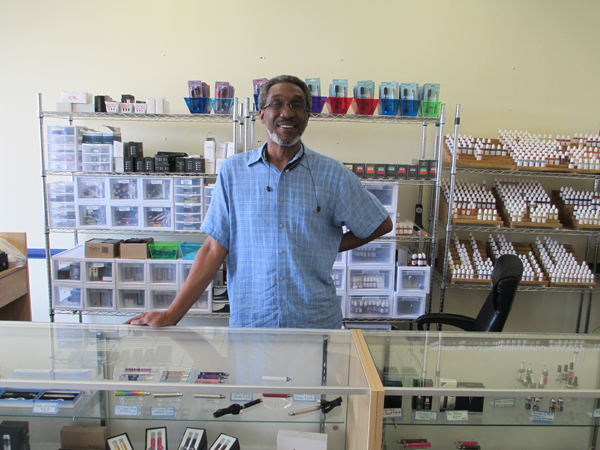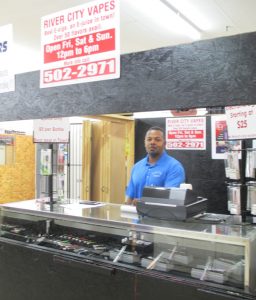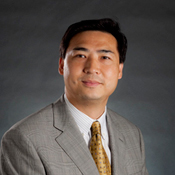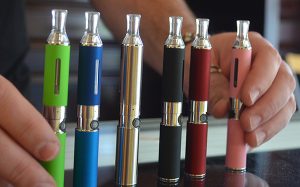
Jimmy Jackson at one of his Vapors Lounge stores. (photo by Michael Thompson)
Jimmy Jackson was just about to light up when an outdoor kiosk caught his eye. In Orlando for a conference, he was doing some shopping at an outlet mall. He walked over to the stand and found something he had never seen before: electronic cigarettes. The owner let him try one.
“I had smoked for 37 years,” Jackson said. “But after I tried an e-cig, I didn’t want another cigarette.”
A few months later, he ran out of juice – the flavored liquid used in e-cigarettes – so he called the company he’d purchased from in Orlando to place an order.
“They said ‘Wow, we don’t have anyone selling in Virginia,’” Jackson said. “‘Would you like to be a distributor?’”
That was in 2008. Today, Jackson and his wife, Francine, sell e-cigarettes online and in two Richmond area storefronts under the name Vapors Lounge. Their newest shop opened in July at Merchants Walk at 7504 W. Broad St., and they have plans for more.
The Jacksons are not alone in taking a gamble on Richmond’s e-cigarette market.
At least five e-cigarette sellers have popped up locally since April, including two in the past month alone.
These upstarts are leasing retail space all over town – even targeting shopping hotspots such as Carytown and Short Pump – and bearing such names as River City Vapes, RVA Vapes and Voltage Vapin’.
The burgeoning industry has attracted both small entrepreneurs and some of the biggest names in tobacco. Altria, Lorrilard and Reynolds American have made a larger push into e-cigarettes in recent months, tempted by a market expected to reach $1.7 billion in value this year and $10 billion by 2017.
“The sugar bag’s been busted,” says Ulysses Benson, who this summer opened a weekend e-cigarette shop at the Jefferson Davis Flea Market.

Ulysses Benson is looking to set up a permanent location for his River City Vapes.
Benson has been selling e-cigarettes since 2005, beginning as an online affiliate for a bigger company and taking his wares to bars and shopping centers looking for buyers.
It took Benson about $4,000 to $5,000 to launch his shop, and he said he pays about $250 a month to sell during the weekends at the flea market. He hopes his stand is a first step toward opening his a brick-and-mortar store on the Northside or in the West End.
The name of the Jacksons’ business, Vapors Lounge, is a good entry point for understanding e-cigarette nomenclature.
It’s more accurate to call electronic cigarettes “vaporizers.” That’s the term typically used by regular users, known as “vapers.” Small batteries inside e-cigarettes heat the juice until it vaporizes and can be inhaled. The juice itself contains varying levels of nicotine, depending on the vaper’s needs, and comes in flavors ranging in taste from tobacco to cotton candy.
Those clouds of “smoke” that billow out of an e-cigarette user’s mouth are either vegetable glycerin, derived from plant oils, or propylene glycol, a substance used in asthma inhalers. It’s there to create the visual and tactile effect that the vaper is smoking. Smokers smoke. Vapers vape.
And among the new e-cigarette sellers in Richmond, one company is putting up millions to ensure that the vapers keep on vaping.
Avail Vapor, which opened its first location in Carytown in July, has plans for nine new locations in Virginia and Maryland by the end of this year.
President and major shareholder James Xu plans to open the next two Avails in Short Pump and Chesterfield.
Encouraged by the early success of the Carytown store, Xu said the aggressive expansion is being fueled by investors and Evergreen Enterprises, a consumer products company at which he is an executive vice president.
“We absolutely think there is a market,” Xu said. “Vaping is like the flip phone. … There is a long way to go until we get to the smart phone.”

James Xu, president and a main investor in Avail Vapor.
With Evergreen, Xu has access to 10 containers going back and forth between China, where Avail buys its e-cigarette devices directly. The company plans to have its own manufacturers there someday, as well. It gets its juice from a pharmacist in Richmond and has 20 people working on research and development, with four patents pending for e-cigarette technology.
Xu sees two markets in the e-cigarette industry: One is for the curious consumer passing through a convenience store, where they can buy a disposable e-cigarette or an inexpensive starter kit. Eventually, Xu believes, that consumer will want to upgrade and seek out a vape shop.
“We’re not competing with [convenience stores],” Xu said. “We’re going toward a different market.”

Some of Avail’s e-cigarette models.
Avail hopes to attract customers with finer touches such as wood grain floors and emphasis on customer service and education.
“Most stores now have a hash shop feel,” Xu said. “[Avail has] the Starbucks experience plus the Apple store [experience], because we have the education element to it.”
Xu estimated that while it would take about $20,000 for his competitors to launch their shops, Avail Vapor shops require a few hundred thousand dollars.
The e-cigarette market remains largely unregulated. In 2010, the Supreme Court put an end to the FDA’s policy of regulating e-cigarettes as a “combination drug-device.” While e-cigarette sellers are quick to point out that vaping is healthier than smoking, they shy away from directly pushing it as a smoking cessation product. That could open the door for the FDA to regulate them as medical devices.
Xu welcomes stricter laws concerning e-cigarettes.
“More regulation might be better,” he said. “We already self-regulate. Ninety percent of the juices are coming from China, and it’s questionable. There are a lot of people who are not qualified and going to ruin this business.”
The FDA plans to unveil new regulations for e-cigarettes this month.
In the meantime, the lack of regulation and the rise in demand leaves room for smaller players like Benson to tap into the market.
“It’s like striking gold,” Benson said. “It works. There’s nothing like backing a product that works for you and that you know will work for other people.”

Jimmy Jackson at one of his Vapors Lounge stores. (photo by Michael Thompson)
Jimmy Jackson was just about to light up when an outdoor kiosk caught his eye. In Orlando for a conference, he was doing some shopping at an outlet mall. He walked over to the stand and found something he had never seen before: electronic cigarettes. The owner let him try one.
“I had smoked for 37 years,” Jackson said. “But after I tried an e-cig, I didn’t want another cigarette.”
A few months later, he ran out of juice – the flavored liquid used in e-cigarettes – so he called the company he’d purchased from in Orlando to place an order.
“They said ‘Wow, we don’t have anyone selling in Virginia,’” Jackson said. “‘Would you like to be a distributor?’”
That was in 2008. Today, Jackson and his wife, Francine, sell e-cigarettes online and in two Richmond area storefronts under the name Vapors Lounge. Their newest shop opened in July at Merchants Walk at 7504 W. Broad St., and they have plans for more.
The Jacksons are not alone in taking a gamble on Richmond’s e-cigarette market.
At least five e-cigarette sellers have popped up locally since April, including two in the past month alone.
These upstarts are leasing retail space all over town – even targeting shopping hotspots such as Carytown and Short Pump – and bearing such names as River City Vapes, RVA Vapes and Voltage Vapin’.
The burgeoning industry has attracted both small entrepreneurs and some of the biggest names in tobacco. Altria, Lorrilard and Reynolds American have made a larger push into e-cigarettes in recent months, tempted by a market expected to reach $1.7 billion in value this year and $10 billion by 2017.
“The sugar bag’s been busted,” says Ulysses Benson, who this summer opened a weekend e-cigarette shop at the Jefferson Davis Flea Market.

Ulysses Benson is looking to set up a permanent location for his River City Vapes.
Benson has been selling e-cigarettes since 2005, beginning as an online affiliate for a bigger company and taking his wares to bars and shopping centers looking for buyers.
It took Benson about $4,000 to $5,000 to launch his shop, and he said he pays about $250 a month to sell during the weekends at the flea market. He hopes his stand is a first step toward opening his a brick-and-mortar store on the Northside or in the West End.
The name of the Jacksons’ business, Vapors Lounge, is a good entry point for understanding e-cigarette nomenclature.
It’s more accurate to call electronic cigarettes “vaporizers.” That’s the term typically used by regular users, known as “vapers.” Small batteries inside e-cigarettes heat the juice until it vaporizes and can be inhaled. The juice itself contains varying levels of nicotine, depending on the vaper’s needs, and comes in flavors ranging in taste from tobacco to cotton candy.
Those clouds of “smoke” that billow out of an e-cigarette user’s mouth are either vegetable glycerin, derived from plant oils, or propylene glycol, a substance used in asthma inhalers. It’s there to create the visual and tactile effect that the vaper is smoking. Smokers smoke. Vapers vape.
And among the new e-cigarette sellers in Richmond, one company is putting up millions to ensure that the vapers keep on vaping.
Avail Vapor, which opened its first location in Carytown in July, has plans for nine new locations in Virginia and Maryland by the end of this year.
President and major shareholder James Xu plans to open the next two Avails in Short Pump and Chesterfield.
Encouraged by the early success of the Carytown store, Xu said the aggressive expansion is being fueled by investors and Evergreen Enterprises, a consumer products company at which he is an executive vice president.
“We absolutely think there is a market,” Xu said. “Vaping is like the flip phone. … There is a long way to go until we get to the smart phone.”

James Xu, president and a main investor in Avail Vapor.
With Evergreen, Xu has access to 10 containers going back and forth between China, where Avail buys its e-cigarette devices directly. The company plans to have its own manufacturers there someday, as well. It gets its juice from a pharmacist in Richmond and has 20 people working on research and development, with four patents pending for e-cigarette technology.
Xu sees two markets in the e-cigarette industry: One is for the curious consumer passing through a convenience store, where they can buy a disposable e-cigarette or an inexpensive starter kit. Eventually, Xu believes, that consumer will want to upgrade and seek out a vape shop.
“We’re not competing with [convenience stores],” Xu said. “We’re going toward a different market.”

Some of Avail’s e-cigarette models.
Avail hopes to attract customers with finer touches such as wood grain floors and emphasis on customer service and education.
“Most stores now have a hash shop feel,” Xu said. “[Avail has] the Starbucks experience plus the Apple store [experience], because we have the education element to it.”
Xu estimated that while it would take about $20,000 for his competitors to launch their shops, Avail Vapor shops require a few hundred thousand dollars.
The e-cigarette market remains largely unregulated. In 2010, the Supreme Court put an end to the FDA’s policy of regulating e-cigarettes as a “combination drug-device.” While e-cigarette sellers are quick to point out that vaping is healthier than smoking, they shy away from directly pushing it as a smoking cessation product. That could open the door for the FDA to regulate them as medical devices.
Xu welcomes stricter laws concerning e-cigarettes.
“More regulation might be better,” he said. “We already self-regulate. Ninety percent of the juices are coming from China, and it’s questionable. There are a lot of people who are not qualified and going to ruin this business.”
The FDA plans to unveil new regulations for e-cigarettes this month.
In the meantime, the lack of regulation and the rise in demand leaves room for smaller players like Benson to tap into the market.
“It’s like striking gold,” Benson said. “It works. There’s nothing like backing a product that works for you and that you know will work for other people.”